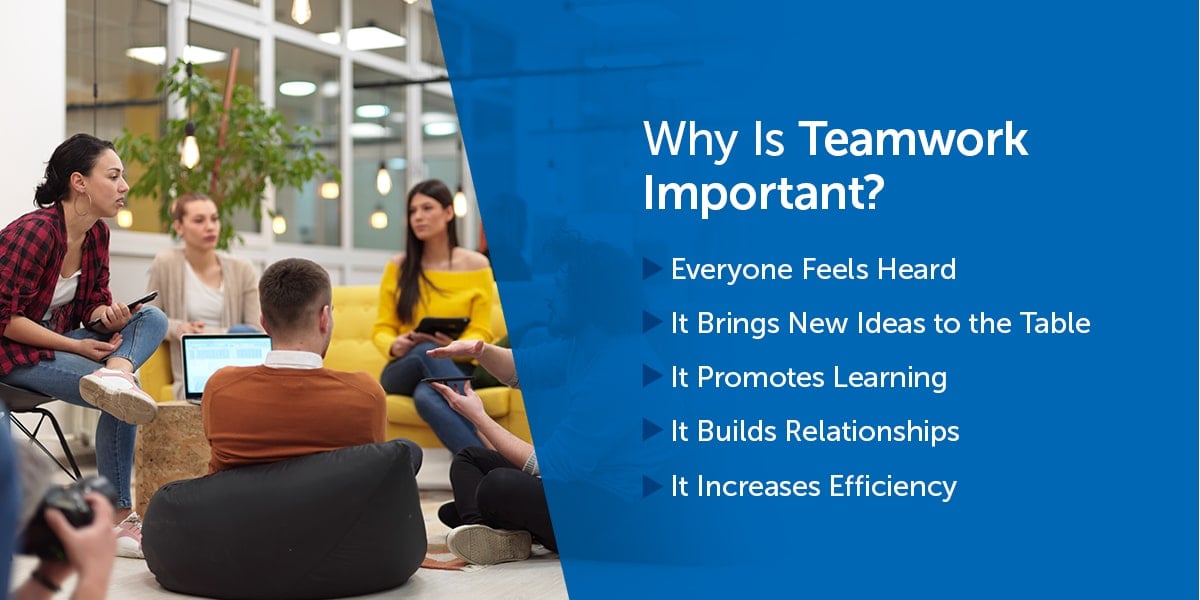
The Importance of Teamwork in the Workplace
Effective teamwork is key to building employee relationships, productivity, new ideas and outstanding company performance. As a boss, manager or leader, part of your responsibility is to help promote a sense of unity and belonging among workers. This requires activities, exercises and values that encourage teamwork.
If you're looking to better prioritize team building and workplace relationships, you've come to the right place. Read on to learn about the importance of teamwork in the office and some ways to encourage it in your own workplace.

Why Is Teamwork Important?
From gathering new ideas to building strong relationships among employees, teamwork benefits the office in a variety of ways. The list below explores merely a few of the many qualities that make teamwork a driving force in the workplace:
1. Everyone Feels Heard
Being part of a team allows everyone to feel heard, including those who don't normally speak up or share their points of view. When you invite everyone to share their thoughts, it reinforces empathy in the workplace, as it shows that everyone is valued and appreciated. This encourages teamwork in the office and helps retain quality employees by building a more positive image for your company.
2. It Brings New Ideas to the Table
Collaboration in the workplace brings out new and valuable ideas. If you're looking for ways to improve your office environment, invite employees to share their input. For instance, you can organize a team meeting and ask employees what changes they'd like to see implemented, such as:
- - Better perks and benefits
- - More flexible scheduling
- - More opportunities to connect outside of work
- - An upgraded physical workspace with improved desks, chairs and equipment
3. It Promotes Learning
Strong teamwork is an excellent way to promote learning. When you encourage employees to share thoughts and ideas as a team, they can experience new perspectives and information. These perceptions and insights can be highly valuable to the office, as they open doors to positive changes and growth areas for the workplace.
4. It Builds Relationships
One of the main benefits of teamwork in the office is that it helps eliminate toxic work culture, which is characterized by drama, tension, low morale and lack of communication. Good teamwork emphasizes the importance of working together, building friendships and helping others, all of which can bring employees together rather than drive them apart. This makes the workplace a more pleasant and enjoyable place for everyone to be.
A sense of community and togetherness in the workplace is crucial for job satisfaction, employee retention and high engagement levels. By recognizing the importance of teamwork, you can help build relationships and promote camaraderie among employees.
5. It Increases Efficiency
One of the biggest challenges business leaders face is keeping their team motivated and productive. Thankfully, team-building is a great way to promote efficiency and job performance. Research shows that employees who work well together have the capacity for increased productivity, accomplishing tasks faster and more efficiently than those who only work individually.
Collaborative work helps employees understand their teammates' roles in addition to their own. Working as a team on projects and assignments allows employees to share responsibilities and ideas. It can also minimize heavy workloads for individuals, especially those who feel pressured to meet work goals and deadlines in a short amount of time.
Teams can agree on strategic plans and goals, distribute responsibilities equally and develop new concepts and ideas. This helps reduce stress in the workplace while allowing them to complete tasks thoroughly and meticulously. Therefore, strong teamwork can boost overall efficiency and productivity in the workplace.
-
How Can You Demonstrate Good Teamwork?
To become a more effective leader, you must demonstrate effective teamwork for your employees and set a good example for them. Below are some examples of teamwork in the workplace you might consider trying out.
1. Make New Employees Feel Welcome
It's important to showcase good teamwork right from the start. That's why it's crucial to implement an effective onboarding and training program — one that instantly makes them feel like they're part of the team.
Introduce new hires to their co-workers, teach them the value of teamwork in their training and have a more experienced employee show them the ropes so they feel more comfortable going into a new job. This is an important way to promote teamwork and retain top talent.
2. Encourage Conversation
Effective communication is an essential way to demonstrate teamwork. A good way to do this is by enabling opportunities for conversation in the workplace. One example is creating an inviting breakroom with comfortable furniture and kitchen appliances.
Additionally, hosting regular business meetings allows employees to share ideas and ask questions. This is also an opportunity to practice team-building exercises, like icebreakers and problem-solving activities. These exercises are designed to stimulate conversation and motivate employees to work collaboratively.
3. Organize Non-Work-Related Events
While it's crucial that employees work well together on a professional level, they should also have opportunities to connect on a personal level. Organizing non-work-related events is a great way for employees to get better acquainted outside of the workplace, unwind and have fun together. Some examples might include a company retreat, trivia night, picnic or barbecue.
4. Coach Your Team
Understanding the brain and what drives human behavior is a helpful way to connect and work with other people. That's why a brain-based coaching program can help promote a successful teamwork-oriented environment. With a research-driven coaching course, you can grow as a leader, improve daily human interactions and build employee relationships.
Build Effective Teamwork Skills With NeuroLeadership Institute
At NeuroLeadership Institute for Individuals, our goal is to help you understand how the brain drives human behavior, using this knowledge to connect with those you coach. Developed by our professional team of neuroscientists, our research-based coaching program teaches vital skills in how the brain learns, regulates emotion, interacts with others and solves problems.
Whether you're an office manager, an HR specialist or a coaching professional, our program is designed to drive positive change in your workplace. While every leadership and coaching experience differs depending on the environment, we'll provide you with the tools, resources and training to help you succeed wherever you are.
To learn more about our programs or determine which one most aligns with your goals, get in touch with one of our education consultants today!

